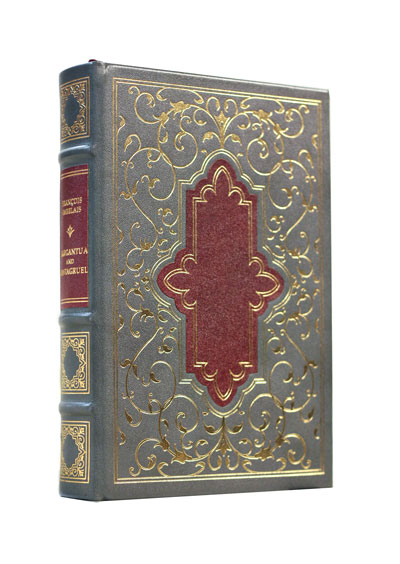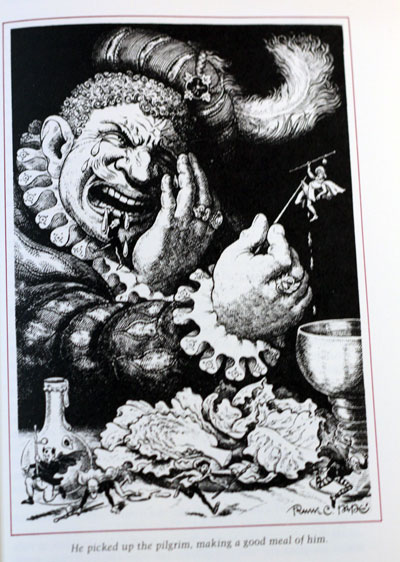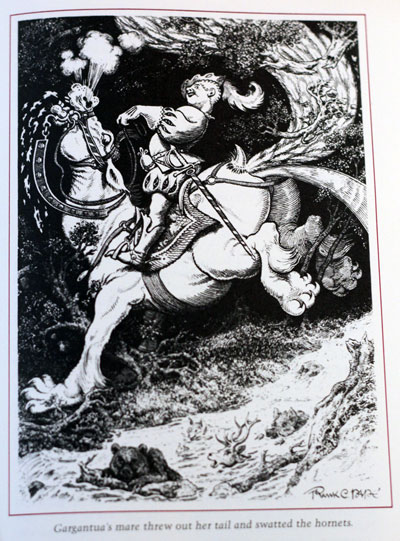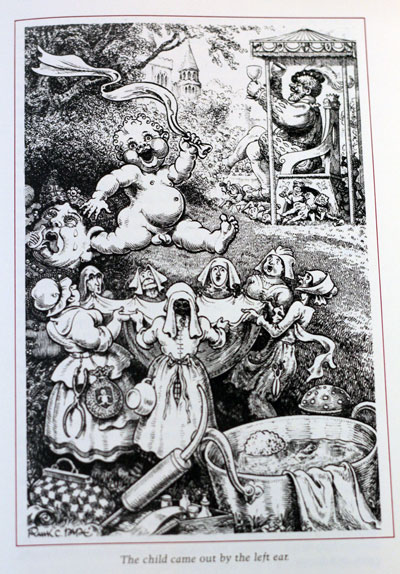About this edition:
This book is a triumph of book design and bookbinding, meant to last for generations. It features:
- Full top-grade leather binding
- Genuine 22k gold gilt to all edges, front design, spine, and back
- Marbled endsheets
- Satin bookmark, sewn-in
- Hubbed spine with raised bands
- Smyth-sewn binding for durability
- Premium acid-neutral archival paper that will not yellow
A writeup by a book collector at Librarything.com:
OXFORD UNIVERSITY PRESS AND FRANKLIN MINT: One Brief, Shining Moment
The Franklin Library, the publishing division of The Franklin Mint, was of course, at one time, the nation’s largest publisher of great books in fine bindings. Founded in 1973, it ceased publishing in 2000. Its early editions ~ fully bound in genuine premium-grade, hand-cut leather, selected for quality of grain and texture ~ were designed and bound by The Sloves Organization, Ltd., an affiliate of the mint, whose bindery was one of the few in the world devoted exclusively to the crafting of fine leather books.
Printed from 1981 to 1985,* the Oxford/Franklin volumes are gorgeous ~ absolutely stunning in their production qualities. Oxford University Press, in fact, specially chose the publishing division of The Franklin Mint to design and produce its World’s Great Books series because of Franklin’s unsurpassed skill in achieving a premium-quality product: each Oxford book must also be ‘a wonder’ in the finest of bookbinding traditions and, if possible, exceed Franklin’s high standard. By that prestigious election, Franklin thus was also doubly honored and formally recognized for the awesome reputation it had achieved in the publishing world throughout the decade of the 1970s.
It is because of that ‘brief, shining moment’ in publication history that these fine classic Oxford/Franklin editions generally surpass anything else ever produced either before or after that time by any of today’s renowned publishing giants. Relatively few titles in the multi-edition Great Books series were given the fabulous full-leather treatment; most were quarter-bound volumes ~ very lovely indeed by the lights of their own publication merits ~ but still unable to boast the same ‘Rolls Royce’ elegance of their full-leather counterparts.
About the book (from wikipedia):
The Life of Gargantua and of Pantagruel (in French, La vie de Gargantua et de Pantagruel) is a connected series of five novels written in the 16th century by François Rabelais. It is the story of two giants, a father (Gargantua) and his son (Pantagruel) and their adventures, written in an amusing, extravagant, satirical vein. The text features much crudity, scatological humor, and violence. Lists of explicit or vulgar insults fill several chapters. The censors of the Sorbonne stigmatized it as obscene, and in a social climate of increasing religious oppression, it was treated with suspicion, and contemporaries avoided mentioning it. According to Rabelais, the philosophy of his giant Pantagruel, “Pantagruelism”, is rooted in “a certain gaiety of mind pickled in the scorn of fortuitous things” (French: “une certaine gaîté d’esprit confite dans le mépris des choses fortuites”).
Rabelais had studied Ancient Greek, and he applied it in inventing hundreds of new words in the text, some of which became part of the French language. Wordplay and risque humor abound in his writing.
The introduction to the series, in an English translation, runs:
Readers, friends, if you turn these pages
Put your prejudice aside,
For, really, there’s nothing here that’s outrageous,
Nothing sick, or bad — or contagious.
Not that I sit here glowing with pride
For my book: all you’ll find is laughter:
That’s all the glory my heart is after,
Seeing how sorrow eats you, defeats you.
I’d rather write about laughing than crying,
For laughter makes men human, and courageous.
BE HAPPY!







